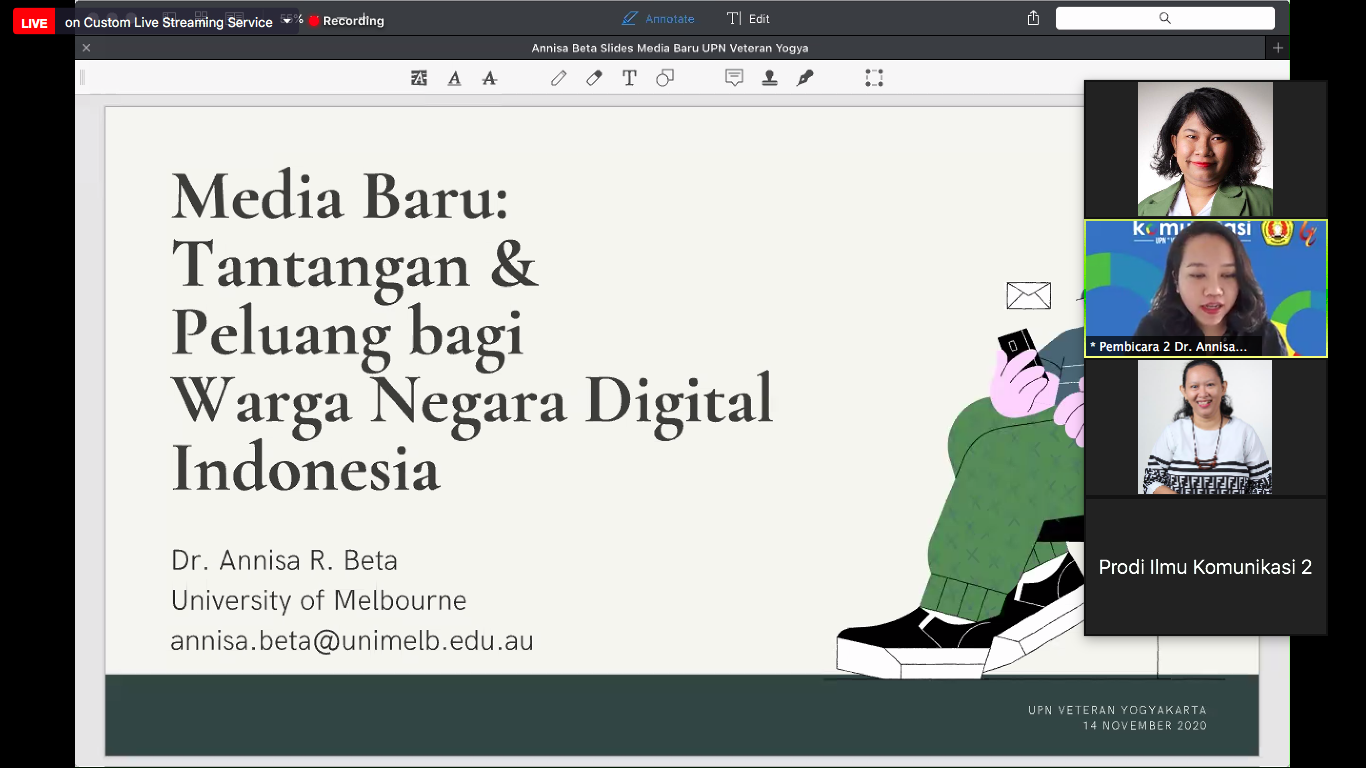YOGYAKARTA – The Public Lecture in order to welcome new 2020 students presented speakers from outside the campus, namely Widodo Muktiyo who serves as Director General of Public Information and Communication (IKP) at the Ministry of Communication and Information Technology (Kominfo), and Annisa R. Beta, an academic from the University of Melbourne. The activity was held online through Zoom Meeting on Saturday (14/11/2020).
The first material was delivered by Widodo Muktiyo on Digital Transformation in the form of Opportunities and Challenges towards Advanced Indonesia. After that, Annisa R. Beta continued by presenting New Media-themed material on the topic of Challenges and Opportunities for Indonesian Digital Citizens.
Widodo Muktiyo explained five steps to accelerate digital transformation based on the president’s direction on 3 August 2020. The first is to accelerate the expansion of access and improvement of digital infrastructure by providing internet services in 12,500 villages or urban villages, as well as at public service points. This aims to eliminate the digital access gap and ensure that internet services cover rural areas and various important points in public services.
“The second is to prepare a roadmap for digital transformation in strategic sectors, including government, public services, social assistance, education, health, trade, industry, and broadcasting,” he said. This plan is expected to direct digital transformation efforts in a coordinated manner, ensure efficiency, and improve service quality in various key sectors.
Next is Accelerating the integration of national data centres. This step is urgent to optimise the use of national data, ensure data is well integrated, and provide a strong basis for policy development and fact-based decision-making.
The fourth step is to prepare regulations, funding schemes, and financing for digital transformation as soon as possible. Regulatory clarity will create a conducive environment for innovation and investment in the digital sector. Meanwhile, structured funding and financing schemes will accelerate the implementation of digital transformation in various sectors.
The last is to prepare the human resource needs of digital talents. In facing the digital transformation era, the provision of human resources who are skilled and trained in digital technology is crucial. The preparation of digital talent needs includes education, training, and development of relevant skills to ensure successful adoption of digital transformation.
Meanwhile, Annisa R. Beta highlighted the existence of platforms, such as Gojek, Bukalapak, Traveloka, and Tokopedia as examples of new media in Indonesia.
Annisa emphasised, “Citizenship is never static.” She explained that the concept of citizenship is not only related to legal status, but also involves active participation in the life of the state and society. According to her, being a digital citizen means more than just having legal status, but also involves active engagement in the digital world.
The participants of this public lecture were enthusiastic in listening to the two speakers, and many stated that the material presented was very relevant to the current development of technology and media. In addition, they also had the opportunity to discuss directly with the speakers through a question and answer session.
UPN “Veteran” Yogyakarta Communication Psychology lecturer, Meike Lusye Karolus, gave her response to this public lecture. “This is a rare opportunity for students. When else can we learn with international lecturers and direct communication,” she said.
She also added that this activity is important to add new perspectives on the impact of digital transformation in Indonesia and the challenges of new media from various parties.
Author : Aradea Ibnu, Irza Triamanda

